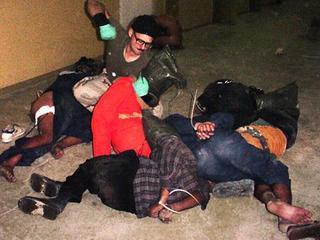NEWS YOU WON’T GET FROM YOUR DAILY PAPER: THE DOWNING STREET MEMO

National Guard Troops in Iraq in 2003- the sign reads: "ONE WEEKEND A MONTH, MY ASS!"
(This column ran in the 6-30-05 THE ALBANY (Ga.) JOURNAL)
"Conservatives saw the savagery of 9-11 and the attacks and prepared for war. Liberals saw the savagery of the 9-11 attacks and wanted to prepare indictments and offer therapy and understanding for our attackers. In the wake of 9-11, conservatives believed it was time to unleash the might and power of the United States military against the Taliban. In the wake of 9-11, the liberals believed it was time to submit a petition."
White House presidential advisor Karl Rove ("The President’s Brain"), speaking to right wing conservatives in June of 2005.
So what do we make of the President’s top advisor- the architect of his political victories in Texas and for the White House- throwing red meat to the right wingers who agree with Ann Coulter that American liberals (roughly 20 percent of voters) are nothing less than "traitors?" Tellingly, one top Republican Senator, Chuck Hagel of Nebraska, called the White House "completely disconnected from reality. It’s like they’re just making it up as they go along."
One explanation for Rove’s outrageous (and absurd) slanders against patriotic Americans is that George Bush in 2005 needs a huge distraction from current events- a harkening to his situation only three years ago. In 2002, the President and his Party, facing a potentially devastating loss in the November 2002 mid-term elections, suddenly began clamoring for a war against a country which had receded into the background since the 1991 Gulf War.
Ordinarily, a political party in control of the levers of government will attempt to highlight its successes and downplay failures. But in the Summer of 2002, the Bush Administration and the Republican Party desperately needed a huge distraction from the growing Enron and WorldCom scandals, the disappeared Clinton surplus which had been transformed into a burgeoning deficit in less than 18 months, negative economic indicators, including a net job loss, and the complete failure to locate Osama bin Laden "dead or alive," as President Bush had vowed to do shortly after the September 11, 2001 attacks. News reports in the Summer of 2002 suggested that the Bush Administration was facing the very real possibility that Democrats would increase their razor thin majority in the Senate while Republicans could lose control of the House. If that had happened, then by November of 2002, Mr. Bush would have been transformed into a relatively powerless lame duck with two years still to go in his first, and probably only, term.
At this point, the astute reader (defined as one who does NOT get his or her information solely from local media here in Albany) may realize that Karl Rove and President Bush are becoming very nervous about current events and are, once again, desperate to throw out as many red herrings as possible to distract the media and the populace from the daily death toll in Iraq and from the potential disaster looming from "THE DOWNING STREET MEMO." If you haven’t heard of this memo or you don’t know why it’s important enough that impeachment murmers are slowly boiling to the surface among House Democrats, then you are probably a victim of the Media and Rove’s massive attempts to distract you with quotes about liberals wanting to provide "therapy" for the 9-11 terrorists, stories on a missing high school girl in Aruba, Michael Jackson’s trial, and (the latest) book deal for the runaway bride from Georgia. Of course, we now have this year’s gay marriage wedge issue- the unashamed wrapping (almost literally) of Congressional Republicans in the American Flag.
As for The Downing Street Memo, it first came to public attention on May 1, 2005, when the Times of London reported the secret minutes of a meeting at the British Prime Minister’s cabinet on July 23, 2002- nine months before President Bush gave the order to American troops to invade Iraq, topple its government, and begin an occupation now into its third year which has cost over 1700 American lives and upwards of $200 billion from the United States Treasury. The explosive information in the minutes of the meeting, now referred to as "The Downing Street Memo," revealed that in the summer of 2002 President Bush had already decided to invade Iraq, was looking at weapons of mass destruction and terrorist connections as pretexts for the invasion, but because the intelligence coming to the Bush Administration didn’t provide the justification, the intelligence was being "fixed" to justify the decision. As the Memo revealed:
"Military action was now seen as inevitable. Bush wanted to remove Saddam, through military action, justified by the conjunction of terrorism and WMD. But the intelligence and facts were being fixed around the policy. The NSC had no patience with the UN route, and no enthusiasm for publishing material on the Iraqi regime's record. There was little discussion in Washington of the aftermath after military action." http://www.downingstreetmemo.com/
As it turns out, the Bush Administration not only made the decision to go to war long in advance of the presentation to the United Nations in February of 2003, but it had also begun a bombing campaign as early as the summer of 2002. As the Memo revealed:
"The Defence Secretary said that the US had already begun "spikes of activity" to put pressure on the regime."
On June 26, 2005, Michael Smith of The Times of London confirmed the 2002 Memo’s observation, reporting that: "[American] Lieutenant-General Michael Moseley said that in 2002 and early 2003 allied aircraft flew 21,736 sorties, dropping more than 600 bombs on 391 "carefully selected targets" before the war officially started."
In the Summer of 2002, the Bush Administration’s hyperbolic warning about an alleged military threat to the United States from Iraq was not only wrong, it was laughable. Both Vice President Cheney and then National Security Advisor Condoleeza Rice warned of a smoking gun in the form of a "mushroom cloud" and argued that America couldn’t afford to wait to find out whether Iraq had weapons of mass destruction poised for use. The truth was, as every member of Congress- Republican and Democrat- well knew, American forces had Iraq virtually surrounded with troops in Turkey and Kuwait, we had no-fly zones in the North and South of Iraq, our Air Force had taken out Iraqi military targets with ease when it suited our purposes, and economic sanctions were still in place. As then Secretary of State Colin Powell testified before the Senate Appropriations Committee on May 15, 2001:
"The sanctions, as they are called, have succeeded over the last 10 years.... The Iraqi regime militarily remains fairly weak. ... It has been contained."
In the summer of 2002, President Bush’s "brain," Karl Rove, set in motion the political demagogue’s hallowed tradition of drumming up a war fever to take the focus away from the disasters over which Bush had presided- not least of which was the question as to how he had failed to anticipate and prevent the 9-11 terror attacks.
By early 2003, when the huge American troop buildup in the desert of Kuwait made it clear that we were going to invade no matter what, the media and Congress once again missed the most obvious signals that the WMD threat was a hoax: virtually every nation bordering Iraq, including our NATO ally Turkey and including Iran- the one country against whom Saddam had used chemical weapons- was urging us not to invade. Turkey went so far as to refuse to allow us to use our bases there as staging areas for a northern front. Had Saddam actually possessed WMD's, the means of delivering them, and the intention to do so, those countries bordering Iraq would have been first in line to be targeted, not the United States half a world away, and they would have been begging us to take out the mad dictator who threatened their citizenry.
In 2002 and 2003 Iraq was no military threat whatsoever to its immediate neighbors, let alone the United States. But President Bush used Congress’s authorization to launch the disastrous war which has diverted essential resources from the real war on Al Qaida in Afghanistan, decimated the military’s ability to recruit, and contributed to annual deficits of over $400 billion.
And the official lies will continue until members of the media and our elected officials recognize that our country and our troops in harm's way are more important than their careers.



